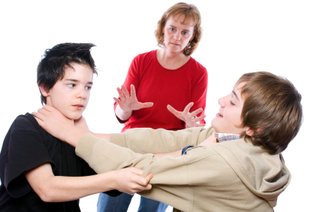
A wise parent once told me that the primary purpose of discipline is to teach a lesson.
Of course, some kids take longer to learn lessons than others. Consequently, if you are looking for instant results, you may be in for a frustrating haul.
A series of recent events had me revisiting the discipline talk I had with said wise parent.
My 8-year-old is killing me with her lies. Granted, most of the untruths she tells are minor, but at times her condition seems pathological.
After brushing it off for a while, I decided that disciplining her was my only recourse. I took away privileges, spoke to her on the importance of telling the truth and drove home the point that she will be held responsible for actions, even if they don‘t cease in a timely manner.
Just when I thought I had played my hand as best I could, another experienced mom reminded me that discipline has a secondary purpose–control. It’s true; many moms and dads attempt to control their child’s behavior in hopes that eventually the kid will learn to control him or herself. The problem is that teaching self control can take years, and in some cases, a lifetime.
Not the most uplifting news when you are crawling through the trenches of parenting, right? I guess that’s why patience is critical when you are raising a child.
Still, it makes sense. Think about it; the last time your son was misbehaving and you put him in a time out you accomplished the primary purpose of discipline—teaching a lesson. Unfortunately, just because you illustrated to your child that negative actions beget unpleasant consequences, doesn’t mean he will change his ways forever and thank you for talking sense into him. Influencing self-control is the result of repeated discipline. After a while, a child may realize that every time he has a meltdown, things happen to him that he doesn’t like, so maybe he ought to find a better way to deal with his emotions.
That may seem a lot to ask of a 3-year-old. After all, by its very essence, an emotional outburst is long on feelings and short on reason. However, experts in the world of discipline note that it’s in those moments of calm following a punishment that kids should be learning negative actions result in negative consequences.
I am hoping my kid realizes that lesson sooner rather than later.
Fortunately, I’m told that even the most strong-willed child can be molded in the hands of a parent willing to persevere when it comes to discipline.
Do you agree?
Related Articles:
Discipline: Playing the Guessing Game
Do You Discipline Your Child in Public?
Do You Punish Your Kids For Swearing?
Do Your Kids Need a Manners Makeover?

